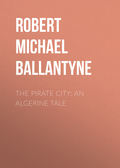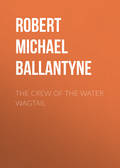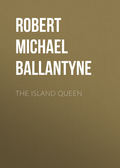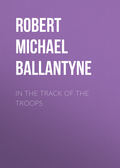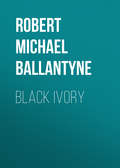
Robert Michael Ballantyne
Freaks on the Fells: Three Months' Rustication
Story 1—Chapter 10.
Lost on the Mountains
Did ever the worthy London merchant, in the course of his life, approach to the verge of the region of despair, it was on that eventful night when he found himself and his family lost among the mountains of Scotland.
“It’s dreadful,” said he, sitting down on a cold grey rock, and beginning slowly to realise the utter hopelessness of their condition.
“My poor Lucy, don’t be cast down,” (drawing her to his breast), “after all, it will only be a night of wandering. But we must keep moving. We must not venture to lie down in our wet clothes. We must not even rest long at a time, lest a chill should come upon you.”
“But I’m quite warm, papa, and only a very little tired. I could walk for miles yet.” She said this cheerily, but she could not help looking anxious. The night was so dark, however, that no one could see her looks.
“Do let me go off alone, father,” urged George; “I am as fresh as possible, and could run over the hills until I should fall in with—”
“Don’t mention it, George; I feel that our only hope is to keep together. Poor Peter! what will become of that boy?”
Mr Sudberry became almost, desperate as he thought of the small clerk. He started up. “Come, we must keep moving. You are not cold, dear? are you sure you are not cold?”
“Quite sure, papa; why are you so anxious?”
“Because I have a flask of brandy, which I mean to delay using until we break down and cannot get on without it. Whenever you begin to get chilled I must give you brandy. Not till then, however; spirits are hurtful when there is hard toil before you, but when you break down there is no resource left. Rest, food, sleep, would be better; but these we have no chance of getting to-night. Poor Jacky! does he keep warm, George?”
“No fear of him,” cried George, with forced gaiety. “He’s all right.”
Jack had broken down completely soon after nightfall. Vigorously, manfully had he struggled to keep up; but when his usual hour for going to bed arrived, nature refused to sustain him. He sank to the ground, and then George wrapped him up in his shooting-coat, in which he now lay, sound asleep, like a dirty brown bundle, on his brother’s shoulders.
“I’ll tell you what,” said Fred, after they had walked, or rather stumbled, on for some time in silence. “Suppose you all wait here for ten minutes while I run like a greyhound to the nearest height and see if anything is to be seen. Mamma must have alarmed the whole neighbourhood by this time; and if they are looking for us, they will be sure to have lanterns or torches.”
“A good idea, my boy. Go, and pause every few minutes to shout, so that we may not lose you. Keep shouting, Fred, and we will wait here and reply.”
Fred was off in a moment, and before he had got fifty yards away was floundering knee-deep in a peat-bog. So much for reckless haste, thought he, as he got out of the bog and ran forward with much more caution. Soon those waiting below heard his clear voice far up the heights. A few minutes more, and it rang forth again more faintly. Mr Sudberry remarked that it sounded as if it came from the clouds: he put his hands to his mouth sailor fashion, and replied. Then they listened intently for the next shout. How still it was while they sat there! What a grand, gloomy solitude! They could hear no sound but the beating of their own hearts. Solemn thoughts of the Creator of these mighty hills crept into their minds as they gazed around and endeavoured to pierce the thick darkness. But this was impossible. It was one of those nights in which the darkness was so profound that no object could be seen even indistinctly at the distance of ten yards. Each could see the other’s form like a black marble statue, but no feature could be traced. The mountain peaks and ridges could indeed be seen against the dark sky, like somewhat deeper shadows; but the crags and corries, the scattered rocks and heathery knolls, the peat-bogs and the tarns of the wild scene which these circling peaks enclosed—all were steeped in impenetrable gloom. There seemed something terrible, almost unnatural, in this union of thick darkness with profound silence. Mr Sudberry was startled by the sound of his own voice when he again spoke.
“The boy must have gone too far. I cannot hear—”
“Hush!”
“Hi!” in the far distance, like a faint echo. They all breathed more freely, and Mr Sudberry uttered a powerful response. Presently the shout came nearer—nearer still; and soon Fred rejoined them, with the disheartening information that he had gained the summit of the ridge, and could see nothing whatever!
“Well, my children,” said Mr Sudberry, with an assumption of cheerfulness which he was far from feeling, “nothing now remains but to push straight forward as fast as we can. We must come to a road of some sort in the long-run, which will conduct to somewhere or other, no doubt. Come, cheer up; forward! Follow close behind me, Lucy. George, do you take the lead—you are the most active and sharp-sighted among us; and mind the bogs.”
“What if we walk right over a precipice!” thought Fred. He had almost said it, but checked himself for fear of alarming the rest unnecessarily. Instead of cautioning George, he quietly glided to the front, and took the lead.
Slowly, wearily, and painfully they plodded on, stumbling at times over a rugged and stone-covered surface, sometimes descending a broken slope that grew more and more precipitous until it became dangerous, and then, fearing to go farther—not knowing what lay before—they had to retrace their steps and search for a more gradual descent. Now crossing a level patch that raised their hopes, inclining them to believe that they had reached the bottom of the valley; anon coming suddenly upon a steep ascent that dashed their hopes, and induced them to suppose they had turned in the wrong direction, and were re-ascending instead of descending the mountain. All the time Jacky slept like a top, and George, being a sturdy fellow, carried him without a murmur. Several times Fred tried to make him give up his burden, but George was inexorably obstinate. So they plodded on till nearly midnight.
“Is that a house?” said Fred, stopping short, and pointing to a dark object just in front of them. “No, it’s a lake.”
“Nonsense, it’s a mountain.”
A few more steps, and Fred recoiled with a cry of horror. It was a precipice full a hundred feet deep—the dark abyss of which had assumed such varied aspects in their eyes!
A long détour followed, and they reached the foot in safety. Here the land became boggy.
Each step was an act fraught with danger, anxiety, and calculation. Whether they should step knee-deep into a hole full of water, or trip over a rounded mass of solid turf, was a matter of absolute uncertainty until the step was taken.
“Oh that we had only a gleam of moonshine,” said Lucy with a sigh. Moonshine! How often had George in the course of his life talked with levity, almost amounting to contempt, of things being “all a matter of moonshine!” What would he not have given to have had only a tithe of the things which surrounded him at that time converted into “moonshine!”
A feeble cheer from Fred caused an abrupt halt:—
“What is it?”
“Hallo!”
“What now?”
“The lake at last!—Our own loch! I know the shape of it well! Hurrah!”
Everyone was overjoyed. They all gazed at it long and earnestly, and unitedly came to the conclusion that it was the loch—probably at the distance of a mile or so. Pushing forward with revived spirits, they came upon the object of their hopes much sooner than had been anticipated. In fact, it was not more than two hundred yards distant. A wild yell of laughter mingled with despair burst from Fred as the lake galloped away in the shape of a white horse! The untravelled reader may possibly doubt this. Yet it is a fact that a white horse was thus mistaken for a distant lake!
The revulsion of feeling was tremendous. Everyone sighed, and Mr Sudberry groaned, for at that moment the thought of poor Peter recurred to his mind. Yet there remained a strange feeling of kindliness in the breast of each towards that white horse. It was an undeniable proof of the existence of animal life in those wild regions, a fact which the deep solitude of all around had tempted them madly to doubt—unknown even to themselves. Besides, it suggested the idea of an owner to the horse; and by a natural and easy process of reasoning they concluded that the owner must be a human being, and that, when at home, he probably dwelt in a house. What more probable than that the house was even then within hail?
Acting on the idea, Mr Sudberry shouted for two minutes with all his might, the only result of which was to render himself extremely hoarse. Then George tried it, and so did Fred, and Jacky awoke and began to whimper and to ask to be let down. He also kicked a little, but, being very tired, soon fell asleep again.
“You must let me carry him now!” said Fred.
“I won’t!”
Fred tried force, but George was too strong for him, so they went on as before, Lucy leaning somewhat heavily on her father’s arm.
Presently they heard the sound of water. It filled them with mitigated joy and excitement, on the simple principle that anything in the shape of variety was better than nothing. A clap of thunder would have raised in their depressed bosoms a gleam of hope. A flash of lightning would have been a positive blessing. Mr Sudberry at once suggested that it must be a stream, and that they could follow its course—wade down its bed, if necessary—till they should arrive at “something!” Foolish man! he had been long enough in the Highlands by that time to have known that to walk down the bed of a mountain-burn was about as possible as to walk down the shaft of a coal-mine. They came to the edge of its banks, however, and, looking over, tried to pierce its gloom. There was a pale gleam of white foam—a rumbling, rustling sound beneath, and a sensation of moisture in the atmosphere.
“It rains!” said Mr Sudberry.
“I rather think it’s the spray of a fall!” observed George.
Had Mr Sudberry known the depth of the tremendous gulf into which he was peering, and the steep cliff on the edge of which he stood, he would have sprung back in alarm. But he did not know—he did not entertain the faintest idea of the truth so he boldly, though cautiously, began to clamber down, assisting Lucy to descend.
Man, (including woman), knows not what he can accomplish until he tries. Millions of glittering gold would not have induced any member of that party to descend such a place in the dark, had they known what it was—yet they accomplished it in safety. Down, down they went!
“Dear me, when shall we reach the foot? We must be near it now.”
No, they were not near it; still down they went, becoming more and more alarmed, yet always tempted on by the feeling that each step would bring them to the bottom.
“What a noise the stream makes! why, it must be a river!”
No, it was not a river—it was a mere burn; quite a little burn, but—what then? Little men are always fussier and noisier than big men; little boys invariably howl more furiously than big boys. Nature is full of analogies; and little streams, especially mountain streams, always make more ado in finding their level than big rivers.
They got down at last, and then they found the stream rushing, bursting, crashing among rent and riven rocks and boulders as if it had gone furiously mad, and was resolved never more to flow and murmur, but always to leap and roar. It was impassable; to walk down its banks or bed was impossible, so the wanderers had to re-ascend the bank, and roam away over black space in search of another crossing. They soon lost the sound in the intricacies of cliffs and dells, and never again found that stream. But they found a narrow path, and Fred announced the discovery with a cheer. It was an extremely rugged path, and appeared to have been macadamised with stones the size of a man’s head. This led them to suspect that it must be a ditch, not a path; but it turned out to be the dry bed of a mountain-torrent—dry, at least, as regards running water, though not dry in respect of numerous stagnant pools, into which at various times each member of the party stepped unintentionally. It mattered not—nothing could make them wetter or more miserable than they were—so they thought. They had yet to learn that the thoughts of men are forever misleading them, and that there is nothing more certain than the uncertainty of all human calculations.
Story 1—Chapter 11.
Still Lost!
Meanwhile, Mrs Sudberry was thrown into a species of frenzied horror, which no words can describe, and which was not in any degree allayed by the grave shaking of the head with which Mr McAllister accompanied his vain efforts to comfort and re-assure her. This excellent man quoted several passages from the works of Dugald Stewart and Locke, tending to show, in common parlance, that “necessity has no law,” and that the rightly constituted human mind ought to rise superior to all circumstances—quotations which had the effect of making Mrs Sudberry more hysterical than ever, and which induced Mrs Brown to call him who offered such consolation a “brute!”
But McAllister did not confine his efforts solely to the region of mind. While he was earnestly administering doses of the wisdom of Stewart and Locke to the agitated lady in the parlour, Dan and Hugh, with several others, were, by his orders, arming themselves in the kitchen for a regular search.
“She’s ready,” said Dan, entering the parlour unceremoniously with a huge stable lantern.
“That’s right, Dan—keep away up by the slate corrie, and come down by the red tarn. If they’ve taken the wrong turn to the right, you’re sure to fall in wi’ them thereaway. Send Hugh round by the burn; I’ll go straight up the hill, and come down upon Loch Cognahoighliey. Give a shout now and then, as ye goo.”
Dan was a man of action and few words: he vouchsafed no reply, but turned immediately and left the room, leaving a powerful odour of the byre behind him.
Poor Mrs Sudberry and Tilly were unspeakably comforted by the grave business-like way in which the search was gone about. They recalled to mind that a search of a somewhat similar nature, in point of manner and time, was undertaken a week before for a stray sheep, and that it had been successful; so they felt relieved, though they remained, of course, dreadfully anxious. McAllister refrained from administering any more moral philosophy. As he was not at all anxious about the lost party, and was rather fond of a sly joke, it remains to this day a matter of doubt whether he really expected that his nostrums would be of much use. In a few minutes he was breasting the hill like a true mountaineer, with a lantern in his hand, and with Hobbs by his side.
“Only think, ma’am,” said Mrs Brown, who was not usually judicious in her remarks, “only think if they’ve been an’ fell hover a precipice.”
“Shocking!” exclaimed poor Mrs Sudberry, with a little shriek, as she clapped her hands on her eyes.
“Poor Jacky, ma’am, p’raps ’e’s lyin’ hall in a mangled ’eap at the foot of a—”
“Leave me!” cried Mrs Sudberry, with an amount of sudden energy that quite amazed Mrs Brown, who left the room feeling that she was an injured woman.
“Darling mamma, they will come back!” said Tilly, throwing her arms round her mother’s neck, and bursting into tears on her bosom. “You know that the sheep—the lost sheep—was found last week, and brought home quite safe. Dan is so kind, though he does not speak much, and Hugh too. They will be sure to find them, darling mamma!”
The sweet voice and the hopeful heart of the child did what philosophy had failed to accomplish—Mrs Sudberry was comforted. Thus we see, not that philosophy is a vain thing, but that philosophy and feeling are distinct, and that each is utterly powerless in the domain of the other.
When Peter was left alone by his master, as recorded in a former chapter, he sat himself down in a cheerful frame of mind on the sunny side of a large rock, and gave himself up to the enjoyment of thorough repose, as well mental as physical. The poor lad was in that state of extreme lassitude which renders absolute and motionless rest delightful. Extended at full length on a springy couch of heath, with his eyes peeping dreamily through the half-closed lids at the magnificent prospect of mountains and glens that lay before him, and below him too, so that he felt like a bird in mid-air, looking down upon the world, with his right arm under his meek head, and both pillowed on the plaid, with his countenance exposed to the full blaze of the sun, and with his recent lunch commencing to operate on the system, so as to render exhaustion no longer a pain, but a pleasure, Peter lay on that knoll, high up the mountain-side, in close proximity to the clouds, dreaming and thinking about nothing; that is to say, about everything or anything in an imbecile sort of way: in other words, wandering in his mind disjointedly over the varied regions of memory and imagination; too tired to originate an idea; too indifferent to resist one when it arose; too weak to follow it out; and utterly indifferent as to whether his mind did follow it out, or cut it short off in the middle.
We speak of Peter’s mind as a totally distinct and separate thing from himself. It had taken the bit in its teeth and run away. He cared no more for it than he did for the nose on his face, which was, at that time, as red as a carrot, by reason of the sun shining full on its tip. But why attempt to describe Peter’s thoughts? Here they are—such as they were—for the reader to make what he can out of them.
“Heigh ho! comfortable now—jolly—what a place! How I hate mountains—climbing them—dreadful!—Like ’em to lie on, though—sun, I like your jolly red-hot face—Sunday! wonder if’s got to do with sun—p’raps—twinkle, twinkle, little sun, how I wonder—oh, what fun!—won’t I have sich wonderful tales—tales—tails—stories are tails—stick ’em on the end of puppy-dogs, and see how they’d look—two or three two-legged puppies in the office—what a difference now!—no ink-bottles, no smashings, no quills, plenty of geese, though, and grouse and hares—what was I thinking about? Oh, yes—the office—no scribbles—no stools, no desks, No-vember—dear me, that’s funny! No-vember—what’s a vember? Cut him in two can’t join him again—no—no—snore!”
At this point Peter’s thoughts went out altogether in sleep, leaving the happy youth in peaceful oblivion. He started suddenly after an hour’s nap, under the impression that he was tumbling over a precipice.
To give a little scream and clutch wildly at the heather was natural. He looked round. The sun was still hot and high. Scratching his head, as if to recall his faculties, Peter stared vacantly at the sandwiches which lay beside him on a piece of old newspaper. Gradually his hand wandered towards them, and a gleam of intelligence, accompanied by a smile, overspread his countenance as he conveyed one to his lips. Eating seemed fatiguing, however. He soon laid the remnant down, drew the plaid over him, nestled among the heather, and dropped into a heavy sleep with a sigh of ineffable comfort.
When Peter again woke up, the sun was down, and just enough of light remained to show that it was going to be an intensely dark night. Can anyone describe, can anyone imagine, the state of Peter’s feelings? Certainly not! Peter, besides being youthful, was, as we have said, an extremely timid boy. He was constitutionally afraid of the dark, even when surrounded by friends. What, then, were his sensations when he found himself on the mountain alone—lost! The thought was horror! Peter gasped; he leaped up with a wild shout, gazed madly round, and sank down with a deep groan. Up he sprang again, and ran forward a few paces. Precipices occurred to him—he turned and ran as many paces backward. Bogs occurred to him—he came to a full stop, fell on his knees, and howled. Up he leaped again, clapped both hands to his mouth, and shouted until his eyes threatened to come out, and his face became purple, “Master! Master! George! hi! hallo–o! Jacky! ho–o–o!” The “O!” was prolonged into a wild roar, and down he went again quite flat. Up he jumped once more; the darkness was deepening. He rushed to the right—left—all round—tore his hair, and gazed into the black depths below—yelled and glared into the dark vault above!
Poor Peter! Thus violently did his gentle spirit seek relief during the first few minutes of its overwhelming consternation.
But he calmed down in the course of time into a species of mild despair. A bursting sob broke from him occasionally, as with his face buried in his hands, his head deep in the heather, and his eyes tight shut, he strove in vain to blind himself to the true nature of his dreadful position. At last he became recklessly desperate, and, rising hastily, he fled. He sought, poor lad, to fly from himself. Of course the effort was fruitless. Instead of distancing himself—an impossibility at all times—doubly so in a rugged country—he tumbled himself over a cliff, (fortunately not a high one), and found himself in a peat-bog, (fortunately not a deep one). This cooled and somewhat improved his understanding, so that he returned to the knoll a wiser, a wetter, and a sadder boy. Who shall describe the agonies, the hopes, the fears, the wanderings, the faggings, and the final despair of the succeeding hours? It is impossible to say who will describe all this, for we have not the slightest intention of attempting it.
Towards midnight Dan reached a very dark and lonely part of the mountains, and was suddenly arrested by a low wail. The sturdy Celt raised his lantern on high. Just at that moment Peter’s despair happened to culminate, and he lifted his head out of the heather to give free vent to the hideous groan with which he meant, if possible, to terminate his existence. The groan became a shriek, first of terror, then of hope, after that of anxiety, as Dan came dancing towards him like a Jack-o’-lantern.
“Fat is she shriekin’ at?” said Dan.
“Oh! I’m so glad—I’m so–o–ow–hoo!”
Poor Peter seized Dan round the legs, for, being on his knees, he could not reach higher, and embraced him.
“Fat’s got the maister?”
Peter could not tell.
“Can she waalk?”
Peter couldn’t walk—his limbs refused their office.
“Here, speel up on her back.”
Peter could do that. He did it, and hugged Dan round the neck with the tenacity of a shipwrecked mariner clinging to his last plank. The sturdy Celt went down the mountain as lightly as if Peter were a fly, and as if the vice-like grip of his arms round his throat were the embrace of a worsted comforter.
“Here they are, ma’am!” screamed Mrs Brown.
She was wrong. Mrs Brown was usually wrong. Peter alone was deposited before the eager gaze of Mrs Sudberry, who fainted away with disappointment. Mrs Brown said “be off” to Peter, and applied scent-bottles to her mistress. The poor boy’s grateful heart wanted to embrace somebody; so he went slowly and sadly upstairs, where he found the cat, and embraced it. Hours passed away, and the Sudberry Family still wandered lost, and almost hopeless, among the mountains.



